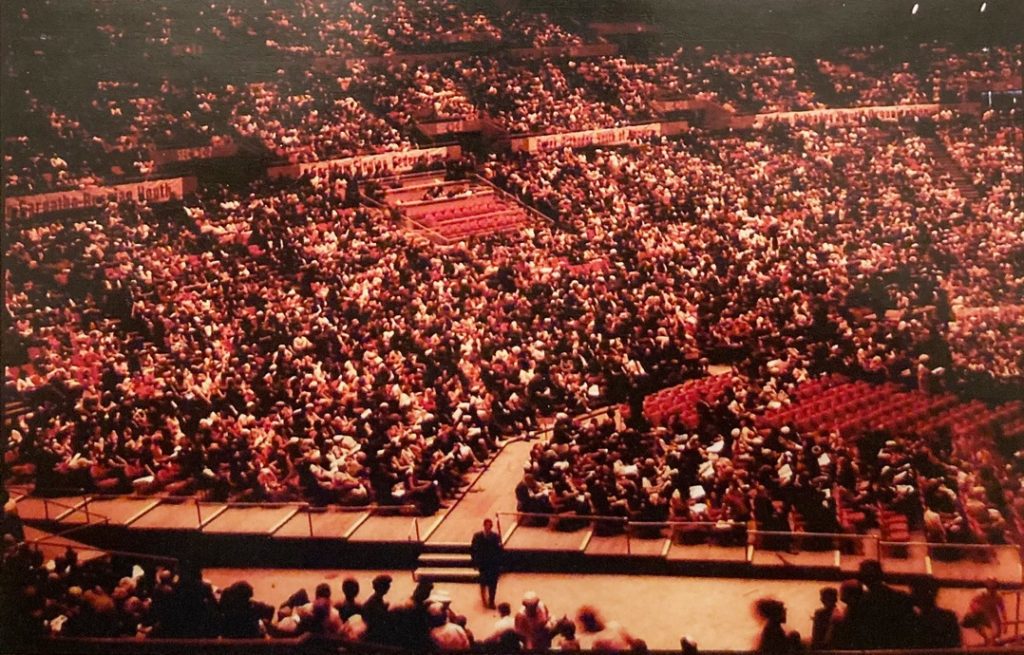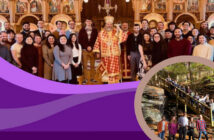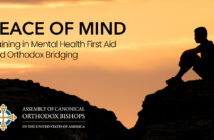
Council of Eastern Orthodox Youth Leaders of the Americas (CEOYLA) Gathering in 1967 at the Mellon Center, Pittsburgh, PA. Approximately 11,000-13,000 attended.
Check your email to confirm your email address immediately after
you sign the Declaration to complete the verification process.
You will receive an email from Civist ([email protected]) with the subject line:
“Petition: Please confirm your signature”
Otherwise, your signature will not be recorded. Thank you!
CLICK HERE to view all signatures to date (updated daily)
View the Declaration’s inaugural publication in the July 5, 2022 editions of
The Wall Street Journal and The New York Times
Over 450 Signatures to Date – Be One of Them!
See the live count above the signature form.
Click here to read comments received from signers.
We believe that we are the most fortunate of people, blessed by God to be Orthodox Christians and to be free Americans. We accept the responsibility to “make disciples of all nations” on these shores, as Christ required of us at His Ascension.
We take inspiration from the statement in 1922 of Ecumenical Patriarch Meletios, who said: “I have seen and understood how exalted the name of Orthodoxy could be…if more than two million Orthodox people were united into one church organization, an American Orthodox Church.”
We see that Orthodox Christian witness in America is weakened by our fragmentation into more than a dozen ethnic enclaves. We believe that Christ weeps at this disunity.
We call all Orthodox Christian people of America – clergy and laity – to come together in a single, unified Orthodox Church of America, under the historic rules and traditions of Orthodoxy.
We look to our hierarchs in the Assembly of Bishops – which was founded in 2009 for this very purpose – to lead us in this quest. We enjoin them – like Joseph of Arimathea – to take courage, and like us, be seen openly to be willing to make sacrifices for the sake of preserving and growing the Church of Christ for our children and for seekers of divine truth.
We declare ourselves to be Americans of proud descent from ancient shores, but no longer part of a church diaspora that puts ethnicity before Orthodox Christianity, lest our Church fades away as ethnic ties diminish over time.
We believe that the administration of our parishes and dioceses from Mother Churches on distant shores is uncanonical and unworkable. We are guided in this by clear Church canons and traditions: that there be only one Orthodox Christian bishop in any location; that foreign bishops have no authority outside their own territory; and that under the established Orthodox tradition of a great majority of places, when an Orthodox Christian national community is developed in a new territory, a single local church be established, uniting every believer in Orthodox doctrine.
We reassert the proper role of the laity in the governance of the Church. We understand this to mean that the laity defers to the clergy in respect and matters of doctrine. In return, we believe that Orthodox Christian tradition and historic practice require that the clergy respects the laity’s call for accountability, transparency, collegiality, adherence to process and the Canons of the Church, and ultimately then, unity.
In making this declaration, we remind ourselves of the historic courage and leadership of lay people in establishing and growing the single Christian Church, in defending the true belief of Orthodoxy during centuries of dispute, and in building new parishes around the world as immigration flourished.
We believe that foreign administration and indifference, and local ethnic fragmentation and disunity, have led, too often, to bad governance. This has contributed significantly to the decline of American parishes and dioceses, as succeeding generations see ethnic churches that are indifferent and unresponsive to their needs in a multicultural America. We believe we are a distinct and mature American Orthodox Christian community, that is ready to become a single, unified Orthodox Church of America.
We understand the apprehension that comes with the prospect of change. We believe that a unified, revitalized Orthodox Church of America would be a formidable spiritual and moral dynamo that would be a powerful force for good in the world, providing more support and vitality to the ancient Patriarchates and Mother Churches than divided, declining ethnic jurisdictions are providing.
We particularly envision a united Orthodox Christian Church of America to be a strengthened bulwark of support for the ancient Patriarchates that no longer have the internal governmental protection that the national Orthodox Churches have. We believe that this united American Church, wielding the potent voice of committed American citizens, will marshal an unprecedented level of material, moral, and political support for world Orthodoxy. A united, growing fellowship of Pan-Orthodox Archons and Guardians of the Faith of other jurisdictions, pledged to support and protect the ancient Patriarchates of Constantinople, Alexandria, Antioch, and Jerusalem, will cement the special relationship that binds children to their parents.
We believe that concerns over loss of traditions, customs, and language are also misplaced, for we strongly ascribe to the American ideal of “e pluribus, unum…out of many, one,” for the keeping of local practices, parish by parish. We believe that language and customs should and must be maintained as parishes choose. In this, the American multicultural experiment will continue, just as it has from its beginning. Early Pan-Orthodox efforts such as International Orthodox Christian Charities (IOCC) and the Orthodox Christian Mission Center (OCMC) will see their good work thrive in a united Church.
We also believe that the American model of the new United States, which needed over a decade from declaring independence to agreeing upon a governing constitution, is a useful model for our new Church governance. This new Church would neither obliterate our Orthodox identity nor ignore our traditions and precedents, but will instead adjust these God-inspired and time-honored tenets within the reality of a unified Orthodox Church of America. We believe we can take our time, grow in Christ, and get it right.
We, therefore, believe that our Assembly of Bishops should – as in historic practice – come together as a synod, elect its own presiding hierarch, proclaim the Church in North America to be an autocephalous, canonical church, and seek recognition of this autocephaly from the fifteen Autocephalous Orthodox Churches.
In this, we call upon the Holy Spirit, Who bathes the world in wisdom and good order, and Who knows no national, ethnic, or any other boundaries, to help make clear to all the earth our prayer: to help our Church prosper, thus to keep and bring Christ into the lives of all people. We pray that the Lord will guide these efforts, that they be imbued always with heartfelt humility, and that the new united Church for which we pray and which we work to create would be, at all times and in all ways, for the greater glory of God.
Orthodox Christian Laity board members authored this declaration in June 2022.
Click Here to read the LETTER SENT TO PATRIARCHS
Original English text and Translations of
“A Declaration for Orthodox Christian Unity in America” (PDF)
Albanian
Arabic
Bulgarian
English
French
Georgian
Greek
Romanian
Russian
Serbian
Spanish
Ukrainian
Remember:
Check your email to confirm your email address immediately after
you sign the Declaration to complete the verification process.
You will receive an email from Civist ([email protected]) with the subject line:
“Petition: Please confirm your signature”
Otherwise, your signature will not be recorded. Thank you!




12 Comments
All for it and soon GOA
Unity is not always a good thing. If the Early Church had sought “unity” with the world around it, we would not have an Orthodox Church. Before I commit to unity among Orthodox in America, I want to know what that means. I remember the Greek Orthodox Church supporting pro-abortion liberal (and anti-Christian) Michael Dukakis when he ran for president simply because he was Greek. That is NOT a criteria for unity. FIRST THERE IS TRUE “ORTHODOXY” ~ that is, Jesus Christ and His Kingdom ~ and from that comes true “unity” of those who embrace that “orthodoxy.” The World wants Christianity to “give up” some of our beliefs to find “unity” with the World. That is the antithesis of everything Christ demanded of us His followers!
Amen! As we know, the Roman Catholic Church, headed by one leader, is attempting to operate outside of Scripture and the Church Fathers. Perhaps a better idea is for the Bishops of the Orthodox Churches to sit down and negotiate as true-believing Christians. This is just food for thought.
ABP. Elpidophoros is wrong. The Greek Orthodox Church under the Abp. IAKOVOS did not support Michael Dukakis, therefore the Church did not support abortion
Valerie, you make good points. However, based on John 17 , God wants His followers to be unified. Hopefully, the result of unity will be a church that does not conform to the world-that is always the struggle both individually and corporately.
Valerie,
If your only criticism of the Declaration is that some members of the Greek Archdiocese supported Dukakis in his1988 spectacularly unsuccessful run for the presidency (George H. W. Bush carried 40 of the 50 states’ electoral votes, one of the largest blow-outs in US history) then you either haven’t read the Declaration or don’t understand Orthodox ecclesiology.
A canonically, administratively united, autocephalous Orthodox Church in the US under a single Synod of bishops would be a greater guarantee of “true Orthodoxy” than the current mishmash of fourteen overlapping, declining, uncanonical “ethnic jurisdictions”.
Christ Himself prayed that we, his followers would be one, as he and His Father are one. [John 17:20-21]
I am in agreement with this writer! One too many power hungry Bishops in my view!
Fr Ted, I hope that you will respond to my post, which was a response to your post, addressing culture/ethnicity and church unity. I very much value your insight and opinions.
Christ is risen!!!
Our youngsters often go off to distant colleges, but our church does not take measures to introduce them to the nearest orthodox church. They become unchurched and subject to the ungodly local culture of the school. We need to include them in the nearest local Orthodox youth ministries in order to keep them in the Church. The Pan-Orthodox Church of the Americas would be instrumental in preserving the faith.
Mr. Mitsinicos,
You are absolutely right! As one of the signers of the Declaration for Orthodox Christian Unity in America, it is clear that you understand the issue and what is at stake. Everyone who has signed to date should recruit 5-10 friends, relatives and co-parishioners to add their names!
Hopefully, the Assembly of Bishops is inching forwards towards unity by adopting pilot programs that will not only connect OCF (Orthodox Christian Fellowship) programs in colleges with each other but also Orthodox parishes of neighboring “jurisdictions” with each other.
These pilot programs are worthy of praise, but they should not detract from the ultimate goal: an administratively united, canonical Orthodox Church in North America. An autocephalous American Orthodox Church under a single synod that elects its own presiding Hierarch would be much more able to bring such programs into fruition than trying to implement them under the present conditions of multiple bishops with jurisdictions of overlapping territories.
How many bishops have parishes in each major metropolitan area in the US? In the Northeast? Southwest? Midwest? in the Southwest and Northwest? How often do these local bishops meet with each other?
One example: A program to bring neighboring Orthodox parishes in the Chicago Metropolitan area together to share ideas and cooperate in various projects and ministries requires the blessing of how many bishops? Two? Five? Eight? More? Obtaining the blessings from each of these bishops is one step, but are each of them equally enthusiastic and committed to the success of this effort? How much easier and better would it be if there were only one bishop.. as required by the canons?
The present situation is untenable. The Assembly has expanded its mission from the charge it was given (“to swiftly bring the Church in this territory into canonical order”) to the minutia of establishing pilot programs and committees, all of which can better be done by a united church, and all of which delay the Assembly from addressing the goal of unity itself.
We do not have to look very far to see why the Assembly is no closer to bringing the Church in America into canonical order than it was when it was established more than a decade ago:
All of its bishops, except for the bishops of the OCA, have been appointed by Synods of “Mother Churches” in Eastern Europe and the Middle-East: Istanbul (Turkey), Damascus (Syria), Moscow (Russia), Belgrade (Serbia), Bucharest (Romania), Sofia (Bulgaria) and Tbilisi (Georgia). These “Mother Churches” are not willing to allow their grown (middle-aged and elderly) children to govern themselves.
Like the Pharoah of Egypt in Exodus 5:1, they are not willing to release their people in the New World from bondage. It is time for the Assembly, like Moses and Aaron, to say to their Mother Synods: “This is what the LORD, the God of Israel says: ‘Let my people go..”.
Moving forward from Exodus to the 19th century: “The most powerful thing in the world is an idea whose time has come.” – Victor Hugo
Moving from the 19th to the 21st century: “The time is now.”
Unity would be good, but I know all too well the machinations of theological liberals (read: wolves in sheep’s clothing); Their dream (our nightmare) of a united church in America under their rule is a serious threat not to be underestimated.
It is, in my estimation, much harder to corrupt over a dozen hierarchies in full communion with one another, than to corrupt one singular hierarchy. North America is the hottest dumpster fire of theological liberalism in the world sans parts of Western Europe, and despite the strength of true faith & tradition the Church has, I fear that North American “values” will have a field day trying to long-march through an incredibly powerful American church hierarchy until it is theirs to pervert and desecrate freely. What’s worse, certain government agencies may help them do it; I would not put it above north american governments to do the very thing which has corrupted the moscow patriarchate for so long, arguably to this day.
If by the grace of God such demons who hide behind false platitudes can be driven and kept out, I would happily rejoice at the establishment of a unified American patriarchate. Until the hierarchs who remain loyal to the truth do what is necessary to enable that future however, I don’t see unification as anything but playing into the hands of the enemy (who loves centralization, because what is centralized can be all the more easily controlled, once corrupted).
Oh, my goodness! Where to begin?
“A Lover of God” is worried about the Evil One getting his hands on the Church in North America if it becomes canonical? He claims to be worried about, but doesn’t identify which of the bishops currently serving in the Assembly of Bishops in America are “theological liberals.. wolves in sheep’s clothing”.
How does one bishop in each territory and all of the canonical bishops serving together in a single local synod as required by Orthodox canons and ecclesiology make it easier to corrupt them?. The same bishops who already comprise the Assembly of Bishops would simply come together as a Synod and elect its own presiding hierarch.
It would be helpful if those who comment on this thread would read the Declaration and point out which parts are not factual, respectful and convincing.
Platitudes like “the enemy loves centralization because what is centralized can be all the more easily controlled, once corrupted” has no basis in fact or practice.
Having each bishop assigned to his own diocese/geographic territory is the opposite of centralization. It is not only the sole canonical solution to our present uncanonical state of overlapping ethnic jurisdictions, it is the very definition of decentralization.
It is also the only way to assure that local hierarchs serve the people entrusted to them rather than the interests of synods in Istanbul, Damascus, Moscow, Belgrade, Bucharest, Sofia, and Tiflis.
Tilting at imaginary windmills and trying to frighten the faithful about “machinations”, “corrupting one single hierarchy” and “the enemy” adds nothing to the discussion about the Declaration, that everyone should read before joining the conversation.